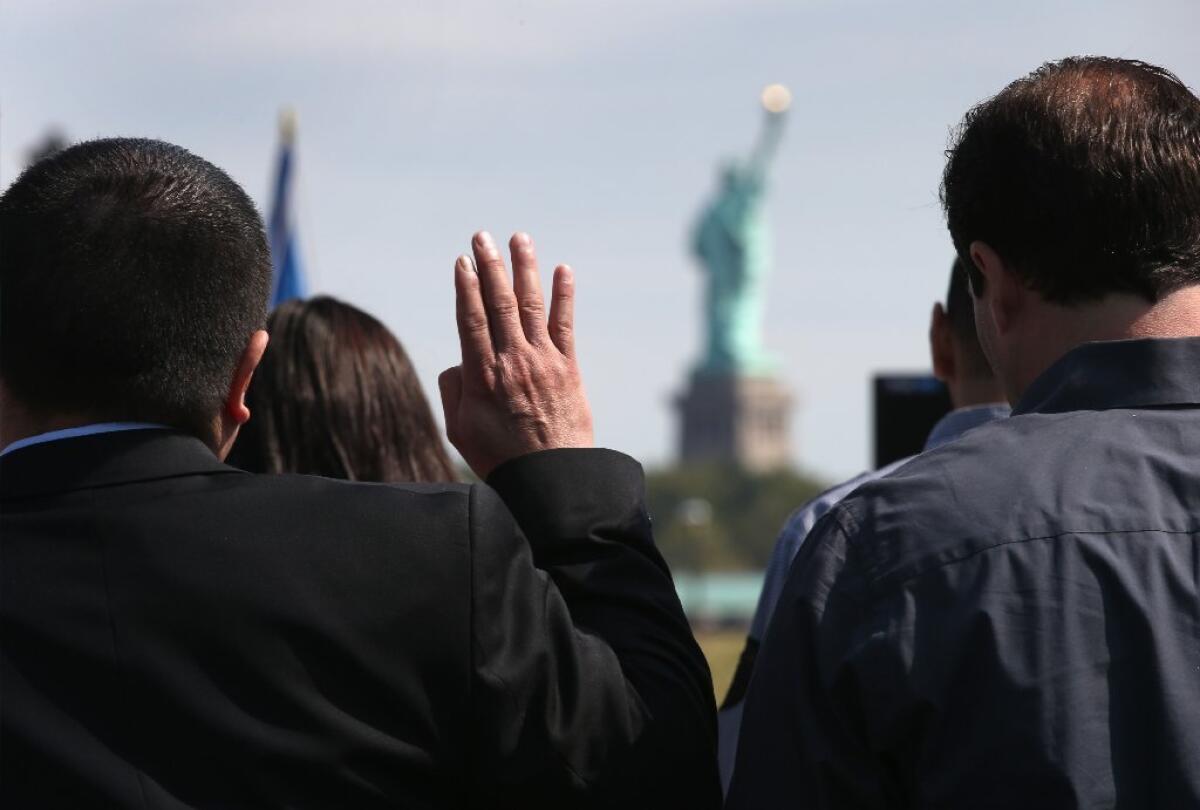Readers React: Becoming an American: Why citizenship and not residency?

It isn’t enough merely to legalize the millions of undocumented residents in this country, The Times’ editorial board wrote in the latest installment of its series examining the meaning of citizenship in the U.S. today. Better, it said, would be to set these people on a pathway to citizenship, both for their good and for the good of our democracy.
Not surprisingly, the reaction wasn’t entirely favorable among our readers, many of whom bristle at calls to confer legal status on the undocumented or even to defer deportation for those brought here as children. Precisely because, as The Times wrote, citizenship carries with it the responsibilities of voting, serving on juries and other acts necessary to maintain our democracy, some of these readers say it shouldn’t belong to those who arrive or stay in the U.S. by breaking its laws. Others doubt that merely calling people citizens wouldn’t address the problems that comprehensive immigration reform sets out to fix.
More interesting (to me, anyway) were the letters from immigrants who hadn’t yet taken the oath of citizenship. While most relished the thought of fully participating in American life by becoming citizens, a few were wary of taking that oath; one said that as much as she wants to naturalize fully, she can’t bring herself to foreswear allegiance to her birth country, even if doing so wouldn’t in practice prevent her from maintaining dual nationality. Her letter and those from other immigrants are an important reminder that acquiring U.S. citizenship, as much as it is an act of immigrating to a new home and adopting a new identity, also involves leaving behind a home and a life.
Here are several reader letters, some of which may be printed in the paper later this week.
British immigrant Julia Jonathan of Santa Monica explains why she isn’t ready to take the oath of citizenship:
I came to this country in 1961 as the wife of an American citizen, who was also a member of a federally recognized tribe, after our marriage in my country of origin, Great Britain. I had a green card in my hand. Since then we have had four children and five grandchildren, and yet I am still not a citizen.
I would be more than happy to pledge allegiance to the United States if I could swear to what my children learned as the pledge of allegiance in school. Unfortunately there is another piece inserted in the oath I am required to swear to in order to gain citizenship. That piece is, “I hereby declare, on oath, that I absolutely and entirely renounce and abjure all allegiance and fidelity to any foreign prince, potentate, state, or sovereignty, of whom or which I have heretofore been a subject or citizen.”
Yes, I know that in practice I can have dual nationality, and that Britain will pay no attention to my renunciation if simply uttered as part of a citizenship ceremony, but I will still be swearing a false oath, and that is something I cannot bring myself to do. Yes, I know that millions of others have done it, but I find that no excuse for doing something I truly believe is wrong.
I came here at the age of 24 and from a culture that at that time instilled in us that an oath is sacred. It is not just words. It is an oath.
How unfortunate that this requirement only excludes those of us who are scrupulously honest.
Los Angeles resident Razmik Ikezian, also an immigrant, says citizenship is an act, not just a status:
I am an approved political asylee from Syria. I possess an indefinite grant for residence and work authorization. I will be applying for permanent residence this coming February. I am enthused to establish U.S. citizenship in the very near future.
The purpose of my wish to acquire citizenship is for two solid reasons: identity and civic engagement. As the editorial author notably points out, citizenship is anything but a mere piece of paper; it’s the right to feel validated by the society we live in, a right one can only prove beneficial when educated and participating in civic duties; an act that’s paramount to the health of representative democracy.
Scott Perley of Irvine doubts that conferring citizenship to undocumented immigrants would serve social cohesion:
The Times asserts that “a large and enduring population of non-citizens undermines social cohesion and encourages prejudice and second-class treatment.” Since when have the “undocumented” been wearing “I am illegal” badges? As to social cohesion, the undocumented are less of a problem than many of our “citizens.”
The Times believes that “citizenship” enables one to participate in the “democratic experiment,” apparently meaning by voting. As The Times notes, however, “citizenship” is more than a piece of paper, but making the piece of paper easier to get serves only a political goal -- it does not create “members of a self-governing commonwealth” willing to accept the attendant “responsibilities.” Simply calling someone a “citizen” does not create social cohesion or stop prejudice.
Streamlining the route to citizenship would exacerbate the situation. As if we haven’t provided enough incentives encouraging immigration, including new minimum wage laws, attracting more is not a solution.
Los Angeles resident Tony Schaffer says economics more than lofty desires for citizenship drive immigration:
Through my work I have come to know a handful of people who are of Mexican descent. Of the few people I have met there has always been a clear message, especially among the first generation: They would prefer to be back home than here in the United States.
Why not open the borders so people can come from Canada and Mexico with work permits? The economic gains made with issuing these permits certainly can mitigate concerns over adding more burdens to our bureaucracy.
“Coyotes” make thousands of dollars per person smuggling people across our border. Think of the lost revenue for both the Mexican and U.S. governments by not capitalizing on that potential income.
The assumption that people from Mexico and beyond want to become U.S. citizens may be erroneous; they may be here only out of necessity. Why not capitalize on their nationalism by allowing access to the U.S. workplace for a fee?
This is part of an ongoing conversation exploring the meaning of citizenship in the U.S. today. For more, join us at latimes.com/citizenship and #21stCenturyCitizen. We’d love to hear from you. Share your thoughts, rebuttals and experiences with us at letters@latimes.com.
Follow the Opinion section on Twitter @latimesopinion
More to Read
Start your day right
Sign up for Essential California for news, features and recommendations from the L.A. Times and beyond in your inbox six days a week.
You may occasionally receive promotional content from the Los Angeles Times.







